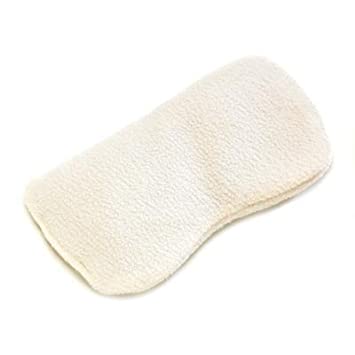Compresses are a simple and useful way of treating a wide range of conditions with essential oils. A piece of clean cloth, a bowl of water (hot or cold, depending on the condition you are treating), your essential oils and some cling film are all you need to make an aromatherapy compress.
Effective healing
Applying a hot or cold compress alone is known to be beneficial in treating sprains, bruises and muscular aches and pains.
By adding essential oils, with properties specific to the condition you need to treat, your home-made compresses will have even greater therapeutic effects.
When you make a compress, try to remember to keep the size of the cloth in proportion to the area being treated.

Best Oils to use for Compresses
There are many essential oils that can be applied in compresses, although a few are particularly versatile and may be used to help with a wide range of conditions.
Eucalyptus
Relieves sunburn, sprains, arthritis, muscular pain and headaches.
Chamomile
Helps to treat sunburn, rashes, sprains, menstrual cramps, headaches and burns.
Ginger
Warms stiff or aching muscles and wards off winter colds.
Lavender
Alleviates bruises, sunburn, rashes, sprains, headaches, migraine, burns and cystitis.
Useful Blends
From cuts and grazes to bruises, sprains and strains, essential oils used with compresses have healing properties that can significantly help in the recovery process.
Compresses for bruises
Apply a cold compress after a bad knock to reduce bruising
- 2 drops lavender oil
- 2 drops tea tree oil
- 2 tablespoons witch hazel
- 500ml cold water
The tea tree and lavender oils speed up the body's healing processes. Astringent witch hazel, available from the pharmacist, is an ancient remedy for reducing bruising.
Compresses for sprains
Sprains and strains are a fact of life if you're involved in sport, but they needn't put you out of the game. Fast, effective treatment can ensure that you're soon fit and back on the field.
After an injury, for a first aid remedy for sports and other injuries, it is best to apply alternate hot and cold compresses over the affected area. To stimulate circulation, dispel toxins and reduce swelling, use 100ml of water and add
- 3-4 drops ginger
- 3-4 drops lavender
For an alternative blend add the following oils
- 3 drops cypress
- 3 drops eucalyptus
Eucalyptus will cool the affected area, while cypress oil will also stimulate the circulation.
Compresses for headaches
To ease headaches, make a cold compress in 100ml of water using the following ingredients:

- 2 drops chamomile
- 3 drops lavender
- 1 drop lemon
Both chamomile and lavender have powerful painkilling and soothing properties. The lemon will cool and refresh. This is a useful blend for holiday headaches by too much sun.
Hot or Cold?
Hot and cold compresses are used to treat different conditions, and it is important to know when to use which type of compress.
Hot Compress
Hot compresses increase circulation to the affected area and work to relieve muscular aches and pains. They are used for:
Abscesses
Arthritis
Boils
Cystitis
Menstrual cramp
Muscle cramp
Rheumatism
Cold Compress
Cold compresses especially those incorporating ice, will reduce swelling. They can also be applied to help:
Bruises
Fever
Headaches
Inflammation
Sprains
Swellings
Hot and Cold
Alternate between hot and cold compresses, changing the compress every three minutes, and finishing with a cold compress. Use for:
Sprains
Arthritis
Rheumatism
How to Make a Cloth Compress
Compresses are simply cloths soaked in water, to which you add essential oils. The process is the same whether hot or cold, apart from the water temperature.
- Add 6 drops of oils to 500ml water in a bowl.
- Place a piece of cotton on the surface of the water to soak.
- Then wring out all the excess water and place the wet, infused cotton over the skin of the area that needs treating.
- Cover the compress with cling film and bandage or cover with a towel to keep the compress in place if necessary.
- Leave the compress in place until it has cooled or warmed to body temperature, then soak and reapply as required.